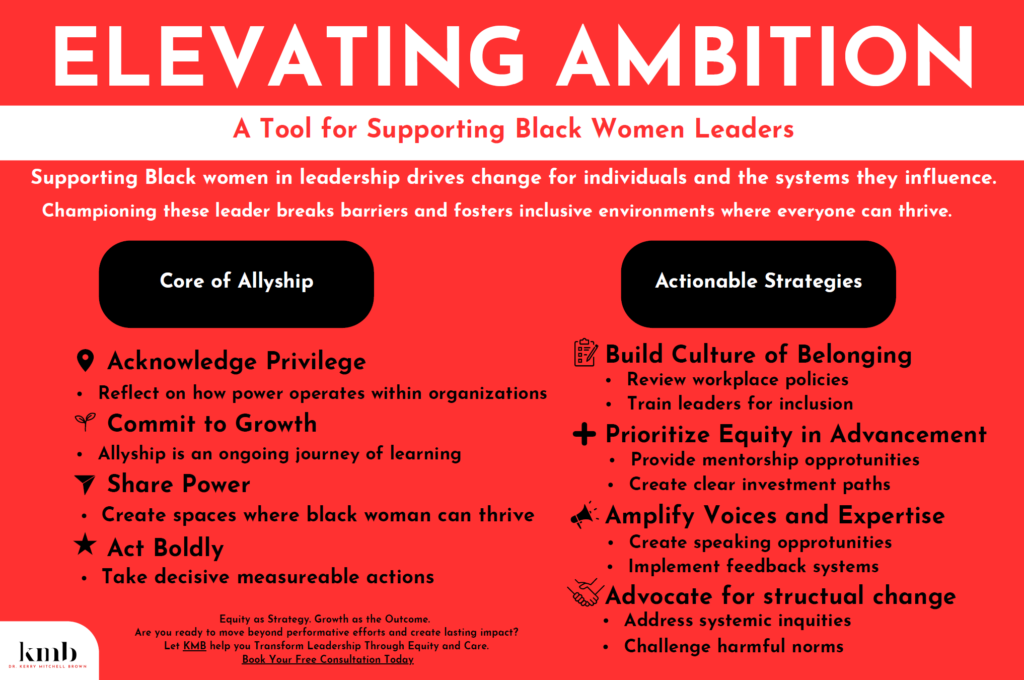Organizations and allies supporting Black women in leadership have a unique opportunity to create transformative change for individuals and the systems they influence. By championing Black women leaders, you contribute to dismantling systemic barriers and fostering inclusive environments where everyone thrives.
The Stakes: Why Support Matters
Black women leaders often face the dual burden of systemic inequities and the expectation to excel beyond measure. They navigate professional landscapes that frequently undervalue their contributions and resilience. Yet, their perspectives and leadership are critical to innovation, equity, and sustainability in the workplace.
Supporting Black women in leadership is not just an ethical imperative—it’s a strategic one. Research consistently shows that diverse leadership leads to better decision-making, higher employee satisfaction, and stronger financial performance. Investing in the success of Black women leaders means investing in the success of your organization.
Defining Allyship and Its Connection to Power
An ally is more than just a supporter; an ally is an active participant in dismantling systems of oppression and inequity. True allyship involves a commitment to self-examination, ongoing education, and deliberate action. It requires recognizing one’s own power and privilege and leveraging them to amplify the voices, experiences, and contributions of Black women leaders.
The Work of a True Ally
- Understand Power Dynamics: Allies must reflect on how power operates within their organizations and society at large. Acknowledging privilege is the first step in using it to challenge rather than perpetuate inequities.
- Commit to Self-Reflection: Allyship begins with understanding one’s own biases and blind spots. This is not a one-time effort but an ongoing process of learning and unlearning.
- Take Decisive Action: Being an ally means more than offering verbal support. It means taking concrete actions to address inequities, whether through policy changes, advocacy, or resource allocation.
- Share Power: True allyship requires the courage to share power—to create spaces where Black women have equal opportunities to lead, influence, and thrive.
Allyship as Mutual Growth
True allyship is not a one-sided effort; it benefits both Black women leaders and their allies. If you view allyship as merely helping others without recognizing how it enriches your own growth, you’ve misunderstood its essence. Supporting Black women leaders challenges you to confront systemic inequities, sharpen your leadership skills, and build a more inclusive and innovative workplace. Allyship compels you to examine your own relationship to power and privilege, enabling you to become a more effective, empathetic leader. A recent study highlights how inclusive leadership styles contribute to higher levels of team innovation and cohesion. When you uplift others, you elevate yourself—as a professional, a leader, and a human being.
Allyship is not performative. It is a transformative practice rooted in humility, accountability, and the unwavering commitment to equity.
Actionable Strategies for Allies and Organizations
1. Build Cultures of Belonging
- Examine Your Policies: Audit workplace policies to identify and address biases or gaps that disadvantage Black women. Ensure equitable access to opportunities and resources.
- Foster Inclusive Leadership: Train leaders to recognize and challenge their own biases and to create spaces where Black women can contribute authentically.
- Celebrate Diversity: Regularly acknowledge and celebrate the achievements of Black women leaders. Visibility and recognition matter.
2. Prioritize Equity in Advancement
- Equitable Opportunities: Ensure Black women have access to mentorship, sponsorship, and high-visibility assignments that accelerate career growth.
- Transparent Pathways: Clearly outline criteria for promotions and leadership opportunities. Transparency reduces ambiguity and bias.
- Resource Allocation: Provide leadership development programs specifically tailored to the unique challenges Black women face.
3. Amplify Voices and Expertise
- Elevate Contributions: Create platforms for Black women leaders to share their expertise. This could include speaking engagements, panels, or thought leadership opportunities.
- Listen Actively: Create mechanisms for Black women to share feedback and ideas without fear of retaliation. Use their insights to guide organizational strategy.
- Partner Authentically: Collaborate with organizations and initiatives led by Black women, aligning your efforts with their goals and amplifying their impact.
4. Advocate for Structural Change
- Advocate Beyond the Workplace: Support policies and initiatives that address systemic inequities affecting Black women in society, such as pay equity and access to healthcare.
- Challenge the Status Quo: Be willing to disrupt harmful norms and practices within your organization and industry. True allyship requires courage and action.
Measuring Success
To ensure your efforts are meaningful, establish metrics that track the impact of your initiatives. Consider metrics such as:
- Representation of Black women in leadership roles.
- Employee satisfaction and retention rates among Black women.
- Engagement levels in mentorship and sponsorship programs.
- Feedback from Black women leaders on organizational culture.
Moving Forward Together
As organizations and allies, your commitment to supporting Black women leaders has the power to shape more equitable, innovative, and thriving workplaces. By taking intentional, sustained action, you not only uplift individuals but also create ripple effects that inspire others to follow your lead.
True allyship requires more than awareness—it demands action.
To help organizations and allies implement these principles effectively, I created the Elevating Ambition Framework—a research-backed approach to supporting Black women leaders through actionable, measurable strategies.

Let’s build a future where Black women leaders can lead authentically, thrive unapologetically, and leave lasting legacies—because when Black women succeed, we all succeed.
